- Home
- Steven Becker
Wood's Wreck Page 5
Wood's Wreck Read online
Page 5
He started paddling out of the canal and toward Boot Harbor. The sensation of paddling at night was unique. All his senses were on full alert, looking for obstacles in the ink black water ahead. Twenty minutes later, he was warmed up and heading out the Knight’s Key channel. As soon as he passed the second marker, he cut to starboard across the shallow bottom. He never would have tried that maneuver in a power boat, but with high tide and the negligible draft of the kayak, he sailed across the flats, spooking several fish that jumped in front of him.
The Seven Mile Bridge lay ahead of him now and he took a few deep breaths, knowing what was coming. The current through the spans was noticeable even in a power boat. If he faltered for any reason, he would be pushed back or—worse—slammed into one of the piers. Ready, he put his head down and paddled hard, remembering advice he had heard somewhere—“Whatever happens, paddle harder”.
Five minutes later he was catching his breath on the calmer Gulf side.
The crux of the trip over, he settled into an easy rhythm as he paddled the five miles to Wood’s Island. The paddle was uneventful, the light from his phone bright enough to alert the few boats that passed that he was there. He figured it was two hours later when the boat kissed the small, sandy beach. His legs were shaky for the first few steps, but he quickly recovered and hauled the boat up the beach to a clump of mangroves that were pulled aside to reveal a clearing with a small skiff on a trailer.
Usually the mangrove branches hid the clearing, and he was sure he had left it that way the last time he was here.
He slid the kayak next to the other boat, yanked the jar from the cup holder, and used the now-dim light from the phone to replace the mangroves. The trail was overgrown from lack of use and the mosquitos found him, but he held the light in front of him and pushed through the brush until the trail ended at a clearing with a small stilt house and shed.
***
Cayenne squinted as the group walked through the doors of the sheriff’s station and out to the sun-baked parking lot. Two attorneys flanked her and a confused Trufante followed. The sweat and salt from yesterday still coated her skin, and she worried her hair was a shade darker from the dirty jail cell. She waited until they were in the rented sedan and the air conditioner was blasting before she spoke.
“Where can we drop you?” She looked at Trufante and drank from a water bottle one of the suits handed her.
“I want to thank y’all for springin’ me. Don’t know when Mac would’ve got around to it.”
“Please answer the question,” Cayenne continued. “I want to be clear here. You are to forget ever seeing me. You don’t remember what I look like, what color my hair is, or the size of my chest. You got that?”
“Well, shit. I thought we were gettin’ on fine.”
She sighed. “You don’t get it, do you?” The best way to buy his silence was to get him out of jail and defend him. Left in there, the Feds would make a deal or interrogate him.
And that would not work in her favor.
Her lawyers had pleaded her absolute innocence, claiming she had just gone for a boat ride. But she needed this guy to go along with it if she were going to maintain that as her story.
“How about this? If you play your part, I can send one of these nice men to defend you at your trial. Probation guaranteed. Otherwise, I can run back in there and file a restraining order against you and rescind your bail.”
“I might be slow, but I’m gettin’ your drift. My bike is at Mac’s. You can drop me there.” He leaned back.
They pulled into Mac’s driveway ten minutes of silence later and dropped the Cajun in the driveway. Without a word, Cayenne turned away from him and waited to be driven home.
Chapter 7
Mel ran along the beach barefoot, letting the feel of the hard, wet sand by the tide line burn off her anger. She had slept little, turning the puzzle around in her mind, but the pieces still didn’t fit. The sun was only three-quarters above the horizon as she picked up the pace for the last stretch of beach, hoping it would clear her head. She arrived, out of breath, at the public restrooms located at the end of Duval Street, and found her running shoes where she had stashed them earlier. Thankfully it was too early for the homeless people in the area to be on the prowl. The stopwatch on her phone showed she had run for almost forty minutes; not a bad time for five miles, especially with two of them in the sand. She felt better, but was no closer to an answer.
There was no one around as she stuck her phone into her shoe and headed back to the water. When she was waist deep, she pivoted and submerged herself, emerging in a breast stroke. She swam into the waves until she was out of breath, then turned and stroked in, using the lights on the restroom to guide her.
The sun, just over the horizon, started to dry her and she retrieved her shoes. She sat on a bench and checked her phone again, hoping for a message from Mac, before replacing it in her armband and putting her shoes back on. Still nothing from him; not all that unusual, but a quick text would have been nice, especially after she had bailed him out.
She slowed her pace on the return trip to the house that served as both Cayenne’s residence and the Coral Garden’s headquarters. Ten minutes later she had covered the mile to the house and slowed to a walk. She turned to the driveway before entering and noticed that Cayenne’s Prius was still not there.
Inside, she checked her email and went to shower. She started thinking about Mac as the water ran over her. Their relationship went back to her high school years, longer ago than her almost forty years wanted to admit. Her dad, an engineering contractor and salvager, had hired Mac out of desperation to repair a bridge, and they had been inseparable for the next twenty years.
Until her father had died.
It still irked her that the two held secrets that she wasn’t privy to, but she had gone through a rebellious period in her twenties and gone “off the reservation”, as her father said. All she wanted as a teenager was to get out of the Keys, and after graduation she had gone to college and then law school at Virginia. With her connections from several summers working as an intern in DC, she landed a position with the ACLU after graduation—something her conservative father had never forgiven her for.
As she had aged, her views changed, and she realized that you couldn’t legislate utopia. Even worse, if you followed the money that paid for the ACLU’s suits, it often led where you didn’t want to go. She’d left the liberal den of the ACLU and moved in with Mac several years ago. Infatuated with him as a teenager, she knew now that the seven-year age difference was too much when she was seventeen and he was twenty-four, but had a whole different ring to it when you said thirty-nine and forty-six.
It had taken years to get over the teenage crush, and there had been some rough patches in their friendship, some the result of her career choice—he always seemed to back her father and others, with the bad relationships he found himself in … or, as she saw it, was trapped in. With the exception of the last two years, they had hardly spoken for a decade.
She turned the water off, toweled herself dry, and started to think about yesterday. As she dressed, she reviewed what she knew. There wasn’t a chance that Mac was a poacher. That much she was sure of. At her desk now, she checked her email again and pulled out a legal pad and pen. There was nothing important in her inbox, and she looked away from the screen and stared at the blank page, finally writing a name in the middle of the paper. She circled it and started stabbing the page with her pen, hoping it would work like a voodoo doll; somehow all roads led to Cayenne Cannady.
***
Mac didn’t have an agenda and lazed around the upstairs living quarters of the small stilt house until the heat forced him outside. He went to turn the fan on, and remembered the power was out. When he’d come in the night before, the lights hadn’t worked, and he’d figured the solar system had shorted in a storm—a fairly common occurrence in the summer. The room heated quickly as the windows were still boarded up; the single open door
providing little ventilation. He went outside to the covered porch and down the stairs of the house, crossed the clearing, and walked over to the small shed.
Then something caught his eye as he went to unlock the door. The lock looked like it had been hammered, and now he remembered the mangrove branches that concealed the boats being out of place when he arrived. Someone had been out here.
Circling the building, he saw a blank spot on the wall with bare wires sticking from several conduits, where the inverter for the solar system had been. That explained why there was no power. He went back to the door knob and inserted the key, hoping the lock was not damaged. Wood had constructed the buildings here to withstand hurricanes, and without access through the door he would have to tear half the windowless building apart to get in.
The key turned in the lock and he breathed a sigh of relief as the door opened. The inside was just as he had left it: Batteries for the solar system were stacked in racks against one wall, and a workbench sat on several drawers full of tools across from it. The far wall was covered with diving and fishing gear. He grabbed a cordless drill, hoping the battery was charged enough to remove the screws from the plywood protecting the windows, and went back to the house.
The solar system was a setback; the missing inverter converted the 12 volts supplied by the photo-voltaic panels to the 110 volts needed for some of the tools and equipment. But he figured he could wire the panels directly to the battery bank to turn on the 12-volt lights and pumps, at least.
The house cooled as soon as the plywood was removed and the windows opened. Wood had used a passive solar design when he built the house, situating the windows to the southeast to take advantage of the prevalent direction of the winds here. The thatch roof, constructed from palm fronds, had two ventilation rings near its apex, allowing convection to suck the hot air out through the roof, while bringing cooler air in through the windows. The large overhangs and covered porch worked to shade the interior from the hot afternoon sun.
His next thought was for his rumbling stomach. Back outside, he checked the chest freezer below the house and quickly closed the lid. The freezer was one of the appliances that ran on 110 volts and from the smell, it hadn’t been running for a while. He went to the hand pump, filled a bucket with water, and headed upstairs. Until he rewired the solar system, there would be no running water. The refrigerator in the small kitchen ran on propane though and still worked. A few beers and some butter were the sole occupants of the cooler section, but in the small freezer compartment he found two lobster tails. He laid these on the counter and went outside.
While the tails thawed, he went back to the shed, figuring the solar system should be his next priority. The batteries and charge controller checked out, and he took a spool of wire, some cutters, and wire nuts back outside with him. In theory, he only needed to connect the hanging wires together and the system would work; but without a means of disconnect in between, he would have to make the connections hot. He quickly made five of the six connections and then picked up a pair of lineman’s pliers to connect the wires. With one hand he grasped the insulated wires, and with the other used the flat-jawed pliers to twist the bare copper together. He flinched when the wires touched and sparked. Once they were connected, he took a large wire nut and threaded it over the joint.
Back inside, he checked the charge controller, now buzzing as the voltage from the solar panels on the roof surged through it. Green lights were illuminated on the display, showing that the unit was functioning. He wiped his brow and relaxed. Now for some food.
He went back upstairs and into the house to check on the lobster tails—now mostly thawed—and took them down to the gas grill under the house. Fifteen minutes later he was relaxing upstairs, the fan spinning mindlessly above him, a plate of lobster and a cold beer from the refrigerator on the table.
As content as he was, he knew he had to make a plan. Once he finished with his lunch he set the plate in the sink and went back outside to the shed. He pulled a variety of fishing gear from the back wall, put it outside, and started organizing it. Next he took a small gas can and a machete and headed back toward the beach.
As he approached Wood’s old skiff, he realized that it was improbable that the only thing stolen was the inverter. The island had been uninhabited for almost two years. He had come out and checked it once every month or so, but with the exception of a brief stay by Mel last year, it looked abandoned. Thieves would have taken anything they could have gotten their hands on. The aluminum hull was undamaged, but the motor was gone. Now his situation was looking grim. He could use the kayak to fish and check traps, but he couldn’t cover anywhere near the area the motor boat could—and successful fishing was all about covering ground. But he knew he needed a boat with a motor to scout the area Trufante and the woman had been poaching.
Using the machete, he slashed at the palm fronds and mangrove branches encroaching on the trail, and arrived back at the clearing covered in sweat. He was tense and nervous, and the labor of clearing the trail had done little to take the edge off. It was a strange feeling having things stolen from you, but unless you lived here you had to expect it. Since Wood had died no one had set foot out here for months at a time. The house and shed were burglar proof, but as he had witnessed, the inverter and motor had proven to be fair game.
Tired and hungry, he went for his phone to see how Mel was. Though it was far from the first time he had thought of her today, he rarely communicated with her … or anyone, unless he needed something. The power was off on his phone, and he pushed the button on top.
Nothing happened.
The battery must have drained from using the light last night. He hadn’t worried about that, as he’d assumed he could just plug it in to recharge, but without 110-volt power that was impossible. He searched the drawers and cabinets for anything with a cigarette lighter attachment that he could rig to charge it with the 12 volts available, but came up empty handed.
Chapter 8
Sometime during the night, the wind and rain woke him from a sound sleep. He got up and closed the windows, and then he moved from the couch where he had fallen asleep to the bedroom. It was a little after four and he lay in bed, unable to sleep. The wind was not the culprit; it was the first time since leaving his house that he had taken enough time to think about his situation.
Up until now, he had been focused on getting out of town and basic survival. Although he didn’t have the food stores to last long, with the fertile waters in his backyard, he knew he could find food. Wood had set the house up to collect fresh water using two five-hundred-gallon tanks to collect the rain runoff from the roof. A 12-volt pump pushed water to a black tank on the roof, where it was heated by the sun. That provided enough hot water for at least a day. Most of the year, when it often rained at least once a day, the tanks remained full. And using fifty gallons a day meant that there were almost three weeks’ worth of water to hold through the dry season, when it rained less frequently. As far as he knew, the tanks had never run dry.
Knowing his basic needs were met, he started to toss and turn, trying to figure out how to clear his name and get his boat and house back. As far as he was concerned, Trufante could go down with the ship. He knew Mel could only defend him to a point. She had been instrumental in getting him released quickly, but he knew how emotional she could get about her causes and her work, and that would get in the way at some point. This was too close to home for her to stay objective. As Mel had said, the burden was on him to clear his name.
With his stash on the reef gone, he had no assets to hire a lawyer … and he suspected he would need a good one to get out of this mess. The red-haired woman with the fake boobs held the key. He was sure of it. Trufante wasn’t motivated or shrewd enough to think up and execute something like this on his own. Those casitas had been down there before him, and the woman knew exactly where they were. Which meant she was the one at fault here. And she’d pulled Trufante into the mess.
The sun wa
s starting to rise now and he did what he was best at and put his problems on the back burner. He went outside to get some water and noticed the sway of the trees. His plan had been to take the kayak out to catch some fish and then check some unmarked lobster traps that Wood had on a nearby reef. But with the wind blowing what he figured to be 15 knots, the kayak would be unmanageable. For now, he was stranded and out of food.
Back upstairs, he turned on the 12-volt marine radio and tuned to the weather station. The forecast was not favorable for the next day or so. Fifteen to twenty-knot winds were expected today, tonight, and into tomorrow. He thought about the skiff sitting without a motor, but realized that without power that was worse than the kayak. There was a wrecked boat on the other side of the island that was worth a look.
He drank a large glass of water to fill his empty stomach and cursed himself for taking the food staples off the island to control the rat population. But there was still a chance he could catch some fish on the better-protected north side of the island while he checked out the wreck. The sand flats there extended out quite a ways, but he could wade out to deeper water and try and cast to a hole or depression that might hold fish. Considering the weather, it was his best chance for food, and with no other plan, he gathered the gear he had set by the shed, grabbed the machete, and set out on the little-used path, slashing at the growth as he went.
Soon the tangle of branches opened to a small beach overlooking a shallow lagoon protected from the wind. The light green water extended for several hundred yards before it turned slightly darker. If there were any fish they would be in the darker, deeper water. He cut a sturdy branch about four feet long and skinned the wet bark from it. Using it as a wading staff, he grabbed a fishing rod, stuck a box with several lures in his pocket, and started wading toward the deeper water, shuffling his feet as he went to scare off any stingrays in his path.

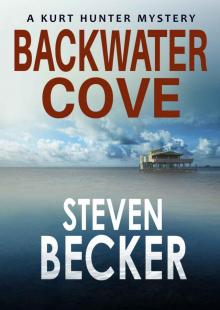 Backwater Cove
Backwater Cove Storm Surge: A Fast Paced International Adventure Thriller (Storm Thriller Series Book 3)
Storm Surge: A Fast Paced International Adventure Thriller (Storm Thriller Series Book 3)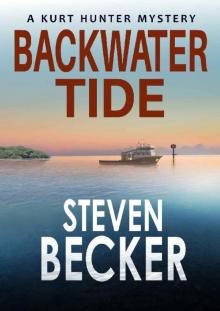 Backwater Tide
Backwater Tide Backwater Pass
Backwater Pass Backwater Flats
Backwater Flats Wood's Revenge
Wood's Revenge Haitian Gold
Haitian Gold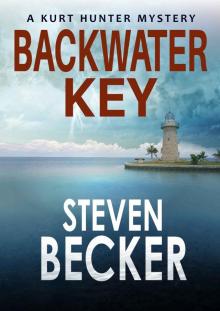 Backwater Key
Backwater Key Wood's Tempest
Wood's Tempest Uncharted Waters
Uncharted Waters Tuna Tango
Tuna Tango The Wreck of the Ten Sail
The Wreck of the Ten Sail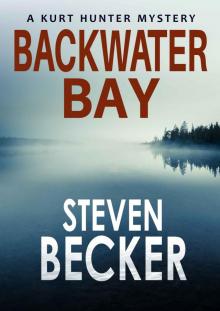 Backwater Bay (Kurt Hunter Mysteries Book 1)
Backwater Bay (Kurt Hunter Mysteries Book 1) Storm Clouds
Storm Clouds Wood's Wall
Wood's Wall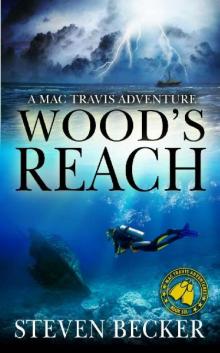 Wood's Reach
Wood's Reach Wood's Fury
Wood's Fury Storm Rising
Storm Rising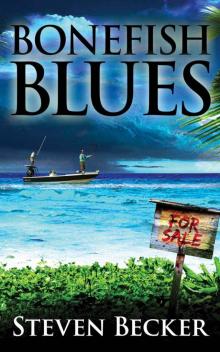 Bonefish Blues
Bonefish Blues Wood's Harbor: Action & Sea Adventure in the Florida Keys (Mac Travis Adventures Book 5)
Wood's Harbor: Action & Sea Adventure in the Florida Keys (Mac Travis Adventures Book 5)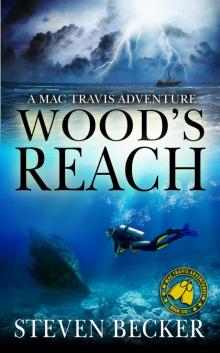 Wood's Reach: Action & Sea Adventure in the Florida Keys (Mac Travis Adventures Book 6)
Wood's Reach: Action & Sea Adventure in the Florida Keys (Mac Travis Adventures Book 6) Wood's Wreck
Wood's Wreck Wood's Harbor
Wood's Harbor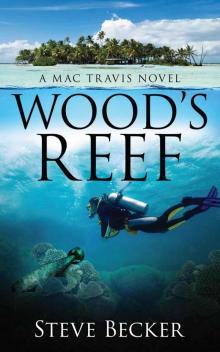 Wood's Reef
Wood's Reef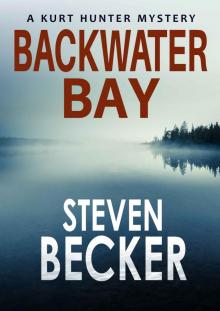 Backwater Bay
Backwater Bay